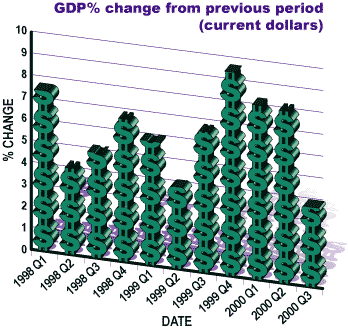
HOT TOPICS LIST
- Strategies
- Stocks
- Buy
- Investing
- Brokers
- Psychology
- Interviews
- Accumulate
- Sell
- Hold
- Spotlight
- Websites
- Candlestick Corner
- Gold & Metals
- Options Trading
LIST OF TOPICS
MARKET COMMENTARY
Is A Recession Looming?
01/26/01 03:16:39 PM PSTby Jayanthi Gopalakrishnan
If the US economy continues to slow, it looks pretty likely.
| George W. Bush has his work cut out for him. With sagging broader stock market indexes, declining retail sales -- especially the auto sector, slumping consumer confidence, and falling factory orders -- plus an increasing number of companies announcing earnings warnings, it's not going to be an easy start to his Presidency. From Figure 1, you can see there has been a sharp decline in growth in the third quarter of 2000.
If the US economy continues to slow, we can expect, among other things, a decline in the value of the US dollar and a bleak outlook for the stock market. Because the demand for goods and services is positively correlated with the direction of stock prices, slower growth could hurt earnings, which will ultimately hurt stock prices. This in turn will cause a dent in consumer spending, a leading economic indicator. After implementing a series of interest rate hikes to curb inflation, the Fed now believes that inflation is no longer a threat. In fact, Fed chairman Alan Greenspan has shifted his concern to future economic weakness, as made evident by his interest rate cut in January 2001. This may help the markets, but it's only one part of the puzzle. There are other concerns. Given the current economic landscape, one of the biggest concerns is whether George W. Bush's $1.3 trillion tax cut is a viable option. The current budget deficit reached a record 4.5% of GDP in the third quarter of 2000. So far, the increase in foreign investments has been sufficient to finance the deficit, but if the US economy continues to slow, foreign investors will pull their money out of the US, causing the dollar to depreciate and interest rates to rise. Then there is the possibility of trade imbalances. If Europe and Asia experience slower growth, US exports may decline. In 2001,US exports are expected to grow by 9% and imports by 12%. This imbalance will certainly not help reduce the current deficit. If a large tax cut such as the one proposed by Bush were implemented, would the US be able to pay off the deficit? It all depends on how much the economy slows. Fortunately, the federal surplus has been growing and is currently at $237 billion, or 2.4% of the GDP. It is expected to continue to grow, but this growth is based on the assumption that the US economy continues to expand. Current forecasts indicate the economy is expected to grow at approximately 3% in the first half of 2001 -- still a positive number, so there's no need to worry about a recession just yet. Keep an eye on the US dollar as well as the global markets, especially Europe and Asia. There's a lot of talk among analysts that the Fed will further cut interest rates in 2001. But if the dollar were to fall sharply, the Fed may find itself resisting cutting rates. This wouldn't paint a pretty picture, especially if the economy slowed at a faster rate than it is at present. In fact, it could set the tone for a recession. |
Staff Writer
| Title: | Staff Writer |
| Company: | Technical Analysis, Inc. |
| Address: | 4757 California Ave SW |
| Seattle, WA 98116 | |
| Phone # for sales: | 206 938 0570 |
| Fax: | 206 938 1307 |
| Website: | working-money.com |
| E-mail address: | Jayanthi@traders.com |
Traders' Resource Links | |
| Charting the Stock Market: The Wyckoff Method -- Books | |
| Working-Money.com -- Online Trading Services | |
| Traders.com Advantage -- Online Trading Services | |
| Technical Analysis of Stocks & Commodities -- Publications and Newsletters | |
| Working Money, at Working-Money.com -- Publications and Newsletters | |
| Traders.com Advantage -- Publications and Newsletters | |
| Professional Traders Starter Kit -- Software | |
PRINT THIS ARTICLE

Request Information From Our Sponsors
- StockCharts.com, Inc.
- Candle Patterns
- Candlestick Charting Explained
- Intermarket Technical Analysis
- John Murphy on Chart Analysis
- John Murphy's Chart Pattern Recognition
- John Murphy's Market Message
- MurphyExplainsMarketAnalysis-Intermarket Analysis
- MurphyExplainsMarketAnalysis-Visual Analysis
- StockCharts.com
- Technical Analysis of the Financial Markets
- The Visual Investor
- VectorVest, Inc.
- Executive Premier Workshop
- One-Day Options Course
- OptionsPro
- Retirement Income Workshop
- Sure-Fire Trading Systems (VectorVest, Inc.)
- Trading as a Business Workshop
- VectorVest 7 EOD
- VectorVest 7 RealTime/IntraDay
- VectorVest AutoTester
- VectorVest Educational Services
- VectorVest OnLine
- VectorVest Options Analyzer
- VectorVest ProGraphics v6.0
- VectorVest ProTrader 7
- VectorVest RealTime Derby Tool
- VectorVest Simulator
- VectorVest Variator
- VectorVest Watchdog

